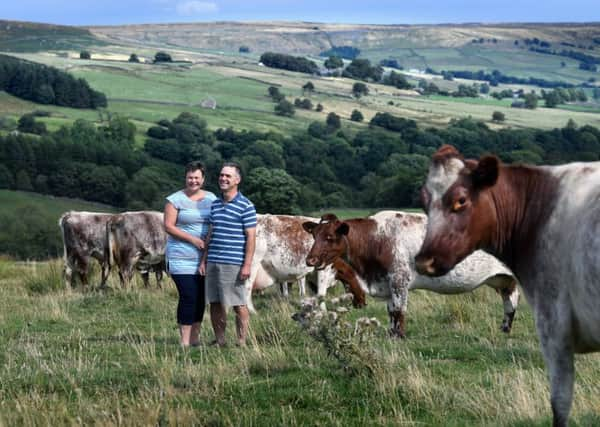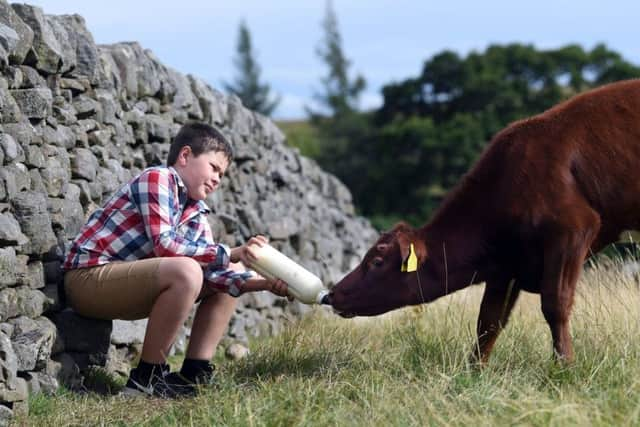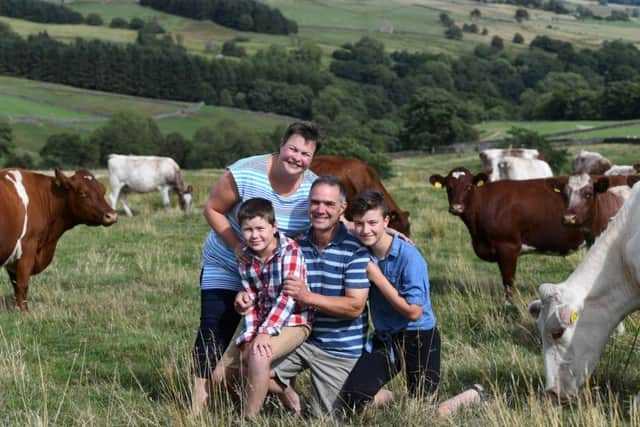Nidderdale couple embrace endangered cattle to forge a new farm future in cheese production


With food experts talking up the importance of food provenance, first generation farmer Andrew Hattan, 49, and his wife Sally, 46, might just be onto something.
In decades past there was a tradition for dairy farmers’ wives to make cheese on their farm using milk from the family herd but much of that cottage industry has been lost through periods of social change and industry innovation.
Advertisement
Hide AdAdvertisement
Hide AdBut in a throwback, the Hattans who live with their two children, Rachael, 13, and Sam, nine, at Low Riggs Farm near Middlesmoor are turning their hand to the lost art in order to make their farm a financially viable concern capable of withstanding the changing political landscape of the future.


In the coming weeks, the couple will begin production of their own ‘Stonebeck’ cheese at the remote 470 acres they rent at 900ft above sea level in the Nidderdale Area of Outstanding Natural Beauty.
They will be the first in Britain to use raw milk from a critically endangered cattle breed, their herd of around 20 Northern Dairy Shorthorn, to produce their own cheese. Such is the excitement around their plans, and the connections they have made along the way, they have already struck deals to supply Stonebeck cheese to some of the country’s most respect cheesemongers, The Courtyard Dairy in Settle and Neal’s Yard Dairy in London.
“It’s a bit of an adventure but it’s a response to trying to make a sensible business out of a hill farm. We want to be here for the long term,” said Mr Hattan, who explained how after years of development all the necessary equipment and infrastructure, including broadband, had been installed at the farm which lies three miles down a rough track that is only accessible by a 4x4.
Advertisement
Hide AdAdvertisement
Hide AdThe couple are also finalising an extension to their farm tenancy, have switched sheep flocks from Swaledales and Dalesbreds to the more easily managed Easy Care breed and are signed up to a stewardship scheme to boost the farm’s environment by planting trees and restoring hay meadows that provide them with a subsidised income until 2024.


Mr Hattan, who has a PhD in energy and metabolism in relation to dairy cattle, said: “We are using all that, as well as keeping rare breeds, as part of our marketing in the hope that the cheese we make will reflect the biodiversity we are trying to encourage back into our grassland.
“I don’t think this level of subsidy will be around that much longer so we need to convert this into something that is sustainable, that will create a flow of income. It’s taken us five or six years to get to this stage and we will start producing cheese this week or next.
“It’s been a long haul but it’s exciting and we have meet a lot of wonderful people along the way.”
Advertisement
Hide AdAdvertisement
Hide AdThe couple will soon be meeting more new faces as they officially launch their new venture. Stonebeck cheese will be available for tasting for the first time during the farm’s open weekend as part of the Yorkshire Dales Cheese Festival on the weekend of September 15 and 16.
The festival begins on September 15 at the Wensleydale Creamery in Hawes with a two-day mini festival comprising 35 stalls of local produce and all-things-cheese together with cookery demonstrations, tastings, pairings and live music.
After that more than 50 events will be held across over 20 scenic spots throughout the Yorkshire Dales National Park and the Nidderdale Area of Outstanding Natural Beauty until September 23.
FARMHOUSE THROWBACK
The Hattans worked closely with Courtyard Dairy owner Andy Swinscoe and Bronwen Percival from Neal’s Yard to develop Stonebeck.
Advertisement
Hide AdAdvertisement
Hide AdThey drew on the Courtyard Dairy’s research into Yorkshire Dales farmhouse cheese making 50 years ago when each farm’s cheese room used slow, gentle maturing processes. Stonebeck will have a softer texture that is less crumbly than larger scale cheese production, and a buttery, less acidic flavour.
Mr Swinscoe said: “Stonebeck will have a lovely depth of flavour and will be a great addition in the drive to revive farmhouse cheeses that are finding ready consumer demand while sitting comfortably alongside modern day versions.
“Low Riggs Farm is a good example of how we can recapture those farming traditions, not just to preserve a piece of social history, but to create viable small-scale units that utilise what we have in the Dales. For instance, the old hay meadows and native breeds that promote the uniqueness of the area and help farmers produce a greater diversity of cheeses, each with different characteristics that express where they’re produced.
“There’s the potential for the Dales to go some way to emulating the small rural fromageries across France that have a great reputation for the wide array of cheeses on offer.”